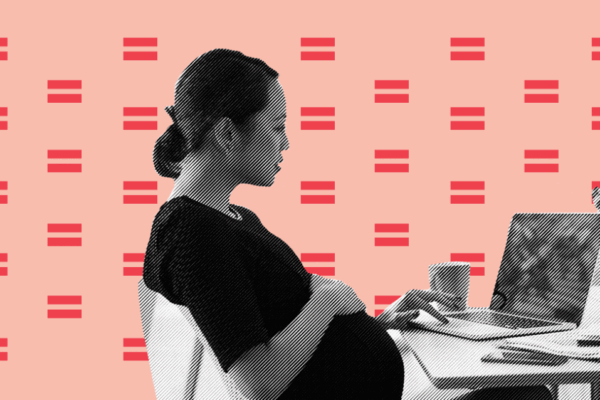This content is intended to serve as general information; it is not legal advice nor intended as legal advice.
Pregnancy at Work
- Employers with four or more employees are required to grant a reasonable accommodation for an employee with a need arising from pregnancy, childbirth, or related condition as long as it does not create an undue hardship for the employer.
- Unless you specifically request leave, an employer cannot require you to take paid or unpaid leave because you are pregnant or breastfeeding if another reasonable accommodation can be provided.
- Some examples of a reasonable accommodation can include 1) allowing an employee to keep water at their workstation, 2) extra bathroom breaks, 3) reprieve from heavy lifting, 4) light duty, or 5) time off to attend prenatal appointments.
- Pregnant people are also protected from discrimination in housing, labor organizations, and other public accommodations ("public accommodation" means any establishment that provides or offers its services, facilities, accommodations, or goods to the public, but does not include a bona fide private club or other place or establishment that is by its nature and use distinctly private.)
- Depending on where you work, you might be entitled to family and medical leave under federal law.
Pregnancy at School
- New Mexico school districts are required to give students ten days of excused absences after the birth of their child and these are not related to medical necessity. Both parents of the child are entitled to the excused absences.
- School districts in New Mexico are also required to grant pregnant and parenting students four additional excused absences per semester.
- Schools are generally required to allow you to express milk for your baby.
Birthing
- You have the right to determine your birthing plan and receive accurate information about your birthing options.
- You have the right to take part in shared decision-making with your healthcare provider.
- You have the right to birth free from discrimination.
- You have the right to decide who is involved with your care, stay with your newborn, have a support partner with you, to breastfeed, and most importantly, you have the right to get information to make your decisions without coercion.
- If you are struggling with substance use and if you are pregnant, that substance use does not, by itself, constitute child abuse. You have the right to get compassionate care from a trusted health care provider to let you know what your options are to have a safe and healthy pregnancy.
- Pregnant people have the same health care rights as anyone else: the right to decide who touches them and how and the right to make all decisions in their health care.
Birthing with a Disability
- If you have a disability, include extended family, chosen family, and support systems in pre-birth and post-birth planning.
- Before birth, take parenting classes and obtain and save proof.
- Identify a lawyer and create a relationship ahead of time; bring their number to the hospital.
- Prepare your home and begin collecting resources (diapers, clothing, bassinet or crib, car seat) and document this with pictures.
- Connect to prenatal care and plan for post-natal care. Identify a pediatrician that you are comfortable with and bring their contact information to the hospital.
- Document decisions made about medication. Bring contact information for your mental health professionals and other members of your support system who can describe and support your plans.
- After birth, connect with your supports (family, friends, home health aid) and connect to Medicaid waiver programs or programs that are experienced in training parents with IDD.
Breastfeeding/Chestfeeding/Lactation
- You have the right to breastfeed/chestfeed wherever you are legally allowed to be (school, work, public, movie theaters, etc.).
- NM employers are required to provide break time and space (other than a bathroom) for lactating parents to pump at work.
- Any place of public accommodation, including businesses and property owners, cannot refuse to offer its services, facilities, products, or property to people because they are pregnant, breastfeeding, or experiencing some other condition related to pregnancy and childbirth.
- You cannot be fired for taking time to express milk during work hours. NM employers generally have to work with you to adapt your work environment, schedule, and job responsibilities while you are pregnant, postpartum, or lactating.
Lactation if you are incarcerated
- In 2017, a district court in Santa Fe found that breastfeeding is a constitutional right under the NM Equal Rights Amendment. The court also found that NM Corrections Department must allow inmate mothers to breastfeed during in-person visitations and must allow inmate mothers to use an electric breast pump to express milk while they are separated from their child.
- New Mexico law provides several rights and protections regarding incarcerated women’s right to breastfeed and lactate – including the ability to continue medication-assisted addiction treatment.
- Further, in 2019, a law became effective and required that by January 1, 2020, every correctional facility that houses female inmates develop and implement a “breastfeeding and lactation policy for lactating female inmates that is based on current accepted best practices.”
Asserting your rights can be challenging and overwhelming, so always do what feels comfortable to you. If you think your rights have been violated, document everything you can about the incident. You can contact the ACLU using the legal complaint form on our website.
Stay Informed
Sign up to be the first to hear about how to take action.
By completing this form, I agree to receive occasional emails per the terms of the ACLU’s privacy statement.
By completing this form, I agree to receive occasional emails per the terms of the ACLU’s privacy statement.

